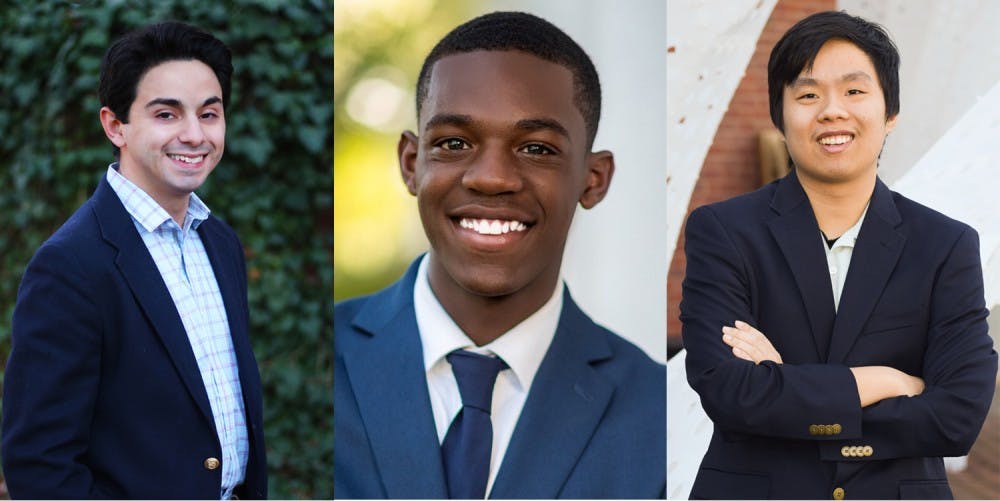The University Board of Elections released its 2018 Candidate Interim Expenditure Report Wednesday, in preparation for student elections Feb. 21 to 23.
Projected total expenses amount to $4,091.49, above the $3,343.64 candidates actually spent last year.
In the Student Council presidential election, third-year College student Eddie Lin budgeted $250, $150 of which will come from a University Board of Elections campaign grant and the rest from personal expenses. Another candidate, first-year College student Jalon Daniels, wrote that he planned to spend $200 in the race, a mix of personal expenses and family donations.
Student Council President candidate Alex Cintron, Vice President for Administration candidate Sydney Bradley and Vice President for Organizations candidate Ty Zirkle are running on a ticket together and are thus sharing campaign materials. The third-year College students plan to split the cost three ways, with each paying $101.13.
Of the three students running for Student Council president, none reported they would spend more than $250 on the election. The push for spending less than $250 comes after 13 endorsing student organizations signed a petition to limit campaign finance spending in the elections.
Several groups, including the Black Student Alliance, University Democrats and College Republicans, pledged to not endorse a candidate if they exceed a predetermined spending limit over the seven-day campaigning period.
“In a system of student self-governance, the ability to campaign for office must be one shared by students from all walks of life,” the petition reads. “We reject any attempts to simply buy elections, especially with the help of outside political organizations.”
The pledge limits campaign spending amounts using a tier system based on the position a candidate pursues.
The first tier applies to students running for Student Council President and limits candidates campaign spending to $250. Other positions are assigned to the next three tiers based on the expenditure caps by UBE grants.
The second tier, a $200 cap, applies to Student Council vice presidential positions and College representatives. The third tier, a $150 cap, applies to class presidents and School of Engineering representatives, while council positions in the Architecture, Commerce, Nursing, Education, and Engineering Schools are capped at $100 in the fourth tier.
UBE requires candidates to report campaign spending and to abide by certain regulations, but does not impose any limit on campaign spending.
“[The University’s General Counsel] didn’t really want us to touch spending caps due to concerns about free speech, political expression, and that kind of thing,” said Casey Schmidt, a fourth-year College student and UBE chair. “They wanted us to focus on being more transparent with where sources of money were coming from and quantities as opposed to trying to limit roth expenditures in ways that could get the University sued and run into legal trouble with basically free speech concerns.”
Wes Gobar, a fourth-year College student, president of the Black Student Alliance and author of the petition, designed the agreement as a way of enforcing spending caps in UBE’s stead.
“Endorsing organizations ... have the power.” Gobar said. “This is a good example of how students can fix the problem if they all band together.”
Due to the lack of campaign finance limit by the UBE, CIOs vowed to rescind an endorsement if a candidate exceeds their designated spending cap.
The petition follows last spring’s Student Council presidential election, in which there was a wide difference in the amounts spent by the two candidates. Fourth-year Batten student Kelsey Kilgore spent $1,125, and fourth-year College student Sarah Kenny spent $337. Kenny won with 82.5 percent of the vote.
Many students, including almost all of those running for Architecture School Council, Batten Graduate Council, College Council and Nursing Student Council, project that they will spend zero total dollars in expenses at the end of their campaign.
First-year College student Amr Metwally is expected to spend the highest amount of money. Running for both Second Year Council President and Student Council Representative, Metwally plans to use $347 of his own money for both campaigns. The report indicates only $67 has actually been used thus far.
Aside from familial donations, UBE grants and joint ticket expenditure pooling, candidates reported no other funding.
The final candidate campaign expenditure reports are due on Feb. 26. This is after the election concludes and results are announced on Feb. 23.
Editor’s Note: The Cavalier Daily Editorial Board is one of the 13 endorsing student organizations that signed the campaign finance petition. The views of the Editorial Board reflect those of its five members and does not represent the opinions of all members of The Cavalier Daily, including those who are involved in news coverage. The Editorial Board is not involved in the objective, news-gathering operations of The Cavalier Daily.







